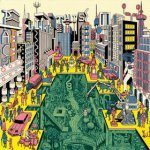
Architecture in Helsinki Places Like This
(Tailem Bend / Polyvinyl / Scotland Yard)
It's safe to say there aren't very many places like this, and depending on the eye of the beholder, it's [un]fortunate that Architecture in Helsinki found it at all. Their first album, Fingers Crossed, was either lauded apathetically or critically panned; their sophomore effort, In Case We Die, found a more stable landing, finding love from initial detractors (Stylus magazine) or even more love from those that were on board from the beginning (Pitchfork). I, personally, found myself in the middle, haphazardly sinking into the candy mountain trip of It'5! or childlike lullaby of Souvenirs; everything else was met with a blank stare and a heavy dose of confusion. But high hopes circled Places Like This, as those boys and girls in Helsinki seemed to realize the difference between trite and fluffy indie pop, and who's to say that they couldn't master the latter in Places?
But Helsinki is stuck in a party it doesn't want to leave; not realizing it should have left 15 beers ago. It's what makes them think that it's a good idea fiddling with electronics and guitar chords in Feather In A Baseball Cap (set to an annoyingly off kilter R&B beat) after the inane jazz-influenced, cat samba of Like It Or Not. Striking an imperfect balance of quirk and assaulting-the-senses, Helsinki applies a method of overproduction that enhance, not mask, the crowded textures underneath it; in Hold Music, it calls to mind the sort of electronica dance rave that was put to such good use earlier this year on LCD Soundsystem's Sound of Silver without ever bothering to capitalize on the idea (the lyrics, berated by the dual female/male vocals, are as insipid as you might expect if you even dare to listen. "While you might escape me, I'll never be free / I'm stuck in the crossfire between you and he").
As Helsinki's other big releases have attested, they don't have to be smart to be fun; even 2007's other electronica releases were sweetly charming in their sexuality, but Places is just an inferior rehash of Fingers Crossed We Die, building on the childlike naivety that has surpassed being a child's finger painting and into a serious form of mental retardation. Dreadfully boring as much as it is painful to listen to, songs like the first single Heart It Races seem one-off in their ideas, unrefined and marching on in African vibes and saddled with unremarkable melodies, not to mention scorching vocals. Others, like Red Turned White, feel like satire, a colossal clash of 80s pop and 90s punk. They don't seem serious, so it's all the more disconcerting when you realize that they are completely serious about this unserious business. It helps some, then, that Red Turned White is one of the more tolerable tracks on the album, creating a diversion from the grating off beat drumming and in-your-face vocal work of Lazy (Lazy).
There are a few saving graces, though they aren't necessarily good, like that of the fittingly titled Underwater that warbles and pops with more quirky attitude than the rest of the album combined, downplaying the vocals into an attribute to the quiet mood than the cause. Nothing's Wrong moves the album towards its ending rather smoothly, even if feels derivative of Aqua (of all bands), while the backing vocals of The Same Old Innocence give off a little spark with its dance groove setting, even if the rest of the song falls flat and ends the album flat on its face.
Otherwise, Places is an intolerable mess, personified by the sound of car crashes in Nothing's Wrong. Unoriginal, haphazardly thrown together and lacking most of what could make it the least bit enjoyable, Places Like This just proves that Architecture in Helsinki is a one trick pony. Let's hope that wherever "this" is, we never have to hear about it again.
6 August, 2007 - 21:24 — Lewis Parry